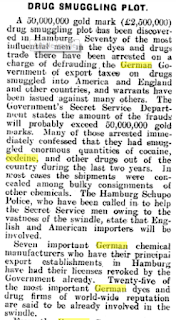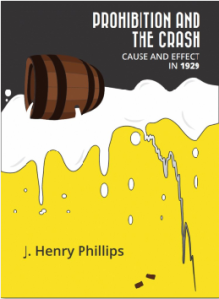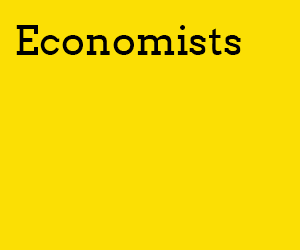Volstead Act Collapse, II-36
 |
| The Democratic Platform of 1924 took note of heroin use (link) |
That year foreign submarines were photographed in the Hudson River (link)
SEC. 36. If any provision of this Act shall be held invalid it shall not be construed to invalidate other provisions of the Act.
SEC. 37. Nothing herein shall prevent the storage in United States bonded warehouses of all liquor manufactured prior to the taking effect of this Act, or prevent the transportation of such liquor to such warehouses or to any wholesale druggist for sale to such druggist for purposes not prohibited when the tax is paid, and permits may be issued therefor.
A manufacturer of any beverage containing less than one-half of 1 per centum of alcohol by volume may, on making application and giving such bond as the commissioner shall prescribe, be given a permit to develop in the manufacture thereof by the usual methods of fermentation and fortification or otherwise a liquid such as beer, ale, porter, or wine, containing more than one-half of 1 per centum of alcohol by volume, but before any such liquid is withdrawn from the factory or otherwise disposed of the alcoholic contents thereof shall under such rules and regulations as the commissioner may prescribe be reduced below such one-half of 1 per centum of alcohol: Provided, That such liquid may be removed and transported, under bond and under such regulations as the commissioner may prescribe, from one bonded plant or warehouse to another for the purpose of having the alcohol extracted therefrom. And such liquids may be developed, under permit, by persons other than the manufacturers of beverages containing less than one-half of 1 per centum of alcohol by volume, and sold to such manufacturers for conversion into such beverages. The alcohol removed from such liquid, if evaporated and not condensed and saved, shall not be subject to tax; if saved, it shall be subject to the same law as other alcoholic liquors. Credit shall be allowed on the tax due on any alcohol so saved to the amount of any tax paid upon distilled spirits or brandy used in the fortification of the liquor from which the same is saved.
When fortified wines are made and used for the production of non-beverage alcohol, and dealcoholized wines containing less than one-half of 1 per centum of alcohol by volume, no tax shall be assessed or paid on the spirits used in such fortification, and such dealcoholized wines produced under the provisions of this Act, whether carbonated or not, shall not be subject to the tax on artificially carbonated or sparkling wines, but shall be subject to the tax on still wines only.
In any case where the manufacturer is charged with manufacturing or selling for beverage purposes any malt, vinous, or fermented liquids containing one-half of 1 per centum or more of alcohol by volume, or in any case where the manufacturer, having been permitted by the commissioner to develop a liquid such as ale, beer, porter, or wine containing more than one-half of 1 per centum of alcohol by volume in the manner and for the purpose herein provided, is charged with failure to reduce the alcoholic content of any such liquid below such one-half of 1 per centum before withdrawing the same from the factory, then in either such case the burden of proof shall be on such manufacturer to show that such liquid so manufactured, sold, or withdrawn contains less than one-half of 1 per centum of alcohol by volume. In any suit or proceeding involving the alcoholic content of any beverage, the reasonable expense of analysis of such beverage shall be taxed as costs in the case.
***
One-half of one percent of a gallon by volume comes to 20 cubic centimeters of alcohol, less than half the volume of a shot glass. To drink enough liquid to absorb a single shot of liquor you'd have to drink two gallons, which is LD 50, the volume that kills half of those foolish enough to try it. Two gallons is enough to so upset electrolyte balance to the point of killing roughly half who drink such a dose of pure water. The Christian nature of this law, and of the 1908 law forcing producers to add deadly poison to industrial alcohol exempted from the "sin tax" excise speaks volumes about such fanatics' claims to be "pro-life" in their motivations for prescribing the deliberate blinding and killing of other persons. (Industrial Alcohol regulations are also found in the Volstead Act)
But even non-chemists can see the energy and labor required to extract potable alcohol from such a weak solution is prohibitive. Far easier to take advantage of huge surpluses of heroin and codeine converted from morphine extracted from opium. And that is precisely what newspaper accounts from faraway New Zealand reveal happened. Today's headlines are full of reports of fatalities resulting from prohibition laws that make everything except poisonous, addictive fentanyl impossible to find.
Already competition for narcotic sales outlets led fanatically prohibitionist China to ruin in a series of opium wars and related turmoil that resulted in some 25 million killed and a communist dictatorship no less bloodthirsty than the Quing Dynasty Empire it replaced. Pressure from Chinese boycotts begun in 1903 persuaded American politicians to export Chinese prohibitionism worldwide by 1909. The Balkan States east of Italy promptly sprouted wars that spread into the chemical refining industries of Switzerland, The Low Counties, France, Austria, Germany and England before blossoming into World War 1 the day President Wilson proclaimed the income tax records of U.S. corporations open to inspection. This slowed but did not stop the Hague Opium Convention from exporting prohibition regulations all over the world.
After WW1, the Armistice treaties and Treaty of Versailles were loaded with unmentionable mention of narcotics. Ratification of the Versailles treaty bound Germany and Austria to the terms of the 1912 Opium Convention--a sad state for the world's largest producer of narcotics and refiner of stimulants that offset some of the side effects of addictive narcotics. No surprise then that the 1924 surge in heroin use brought forth the 1925 drug prohibition convention instead of the much more sensible legalization of alcoholic beverages--which formerly competed with narcotics. This was followed by the use of tax laws as weapons of prohibition against both, with the 1927 disturbances and 1929 market crashes they caused.
We'll be returning to all this while examining the 1937 Technical Analysis of the 1931 Narcotics Limitation Convention that did to the German banking system what alcohol and drug prohibition was then doing to the U.S. banking system and financial markets. Ask yourself whether it seems strange that you have to go to New Zealand newspapers to find information so carefully elided from the U.S. and Canadian press.
***
Good reading: Roosevelt's Secret War: FDR and World War II Espionage, by the talented Joseph Persico. The Roosevelt family fortune came in large part from Warren Delano II's dealings in opium even before the Civil War made it suddenly more lucrative. This is of course omitted from the story of how subtly qualified was FDR, descended from a drug empire, to wage a global war against an industrial-era rival conglomerate of that same trade. Yet the book is a worthwhile read for anyone interested in how These States extricated Europe from a tar-baby of it's own design. (link)
Find out the juicy details behind the mother of all economic collapses. Prohibition and The Crash–Cause and Effect in 1929 is available in two languages on Amazon Kindle, each at the cost of a pint of craft beer.

Brazilian Sci-fi from 1926 featuring the usual beautiful daughter of a scientist touting prohibition and racial collectivism in America’s Black President 2228 by Monteiro Lobato, translated by J Henry Phillips (link)

Brazilian blog…
American blog…
Tagged: prohibition, confiscation, asset forfeiture, initiation of force, blackouts, energy crisis, liquidation, liquidity, bankruptcy, Crash, Depression, communism, inviting attack, treason, economic collapse,




Comments
Post a Comment